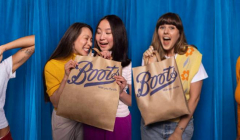
Boots captures the joy of saving
The Savvy Savers campaign features Boots shoppers celebrating the savings they’ve made.

Rahul Titus, Head of Influence at Ogilvy UK introduces the agency’s latest report about the evolution of influencer marketing during COVID-19 and offers the trends to look for post-lockdown.

At a time where consumers have been confined to their homes, and social contact has been limited, influence has been pulling to the forefront of our increasingly virtual reality. Where other channels have been on the back foot, unable to activate amongst social distancing, influence has found itself in a unique position.
This industry is born out of bedrooms and built upon the ability to create virtual connections. Its agility is well suited to a climate in which circumstances change on a daily basis. During these turbulent times, it’s those who we opt-in to engage with on a daily basis that we’re choosing to listen to, and marketeers need to take note.
However, it’s also becoming apparent that we cannot look to follow a linear post-COVID-19 strategy. Instead we must look at an evolving loop for the changing stages of lockdown. One which sees strategies needing to flex and flow, depending on a rapidly shifting societal structure and freedoms.
As the economy slowly starts coming out of lockdown, here are some considerations to help supercharge your influencer plans and help inform your brand strategies.
Brands need to be looking to digital tastemakers for the new cultural milestones of 2020.
Rahul Titus
Think short and long
Influence shouldn’t just be a quick transaction-driving solution; it should be a key component of the marketing mix helping build brands across all three time horizons, now, near and far.
Remember the status quo isn’t coming back
Don’t hold marketing spend back, planning to ramp up communications once lockdown is over; COVID-19 is not going anywhere fast. And it has been shown that this will damage your brand in the long term. Adapt and grow within this new world.
Reconsider the cultural calendar
The touchpoints of yesteryear are no longer relevant. Brands need to be looking to digital tastemakers for the new cultural milestones of 2020. Long-form video and serialised content streams are an interesting proposition for brand partnerships with influencers for this summer.
Hyper-local influence
With the rise of local communities, hyper-local targeting is becoming increasingly relevant to marketeers. It gives brands the ability to harness local authority or the influence of an individual, to drive hyper targeted messages within a community, based on location and interests, helping brands be more efficient with budget.
Social commerce
Improved platform capabilities and shifts in consumer behaviour trends show the increased need to integrate social within a brand’s commerce proposition. Marketers need to focus on closing their consumer journey loop between social content and purchase. Influencer’s product recommendations have never been more relevant.
Ensure there is added value and purpose in all communications
Brands should be always on, but more importantly always relevant. The same goes for influencer relationships. Only get involved in the conversations that matter to the brand and with the influencers who share the brand’s purpose, or risk being seen as opportunistic during this crisis.
Employees as influencers
Employees can provide a real face for businesses which is vital to help consumers feel a connection with brands. Humans form connections with other humans, not businesses. Employees can humanise brands and provide a front-line face across both internal and external comms.
Influencer-enabled virtual experiences
Use the audience knowledge of influencers, and their at-home creativity to supercharge virtual experiences from the early planning stage. Invest in virtual community moments, as these memories will last beyond lockdown.
Make sure influencers are adhering to the rules
Vet not only for ad disclosure compliance, but compliance to the new social rules and government guidance, to protect against backlash via negative association. Investigate not only the risk of fake followers, true reach, engagements and previous collaborations but also how the influencer is responding to COVID-19, and whether the brand will work with their approach.
Visit Ogilvy UK's profile to download the full report and find out more about the evolution of influencer marketing during the COVID-19 crisis and the latest trends to help inform your influencer marketing plans post lockdown.


Rahul has been a prominent player in the word of influencer marketing right from its infancy. He is the Head of Influence at Ogilvy, having built the influence specialism in the past couple of years. He is in charge of setting the strategic direction of the Ogilvy influence proposition that covers that full spectrum of influencer work, from celebrities all the way to micro-influencers. He heads up a team of creative experts who are responsible for delivering best in class influencer marketing for clients including Walgreens Boots Alliance, Bacardi, Vans, PlayStation, Unilever, TK Maxx, British Airways and Mattel. He has presented and commented on expertise around influence for Blogosphere, Campaign, The Drum and PRWeek. Rahul has a degree in Finance and Economics from Christ College and a Masters in Marketing from the University of Manchester.
Looks like you need to create a Creativebrief account to perform this action.
Create account Sign inLooks like you need to create a Creativebrief account to perform this action.
Create account Sign in